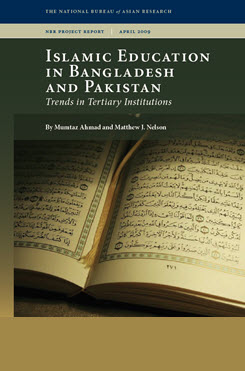Religion, Politics, and the Modern University in Pakistan and Bangladesh
This paper provides an account of the relationship between religion and politics in the public- and private-sector universities of Pakistan and Bangladesh.
EXECUTIVE SUMMARY
This paper provides an account of the relationship between religion and politics in the public- and private-sector universities of Pakistan and Bangladesh. Acknowledging that religion and religious education are thoroughly institutionalized (even in ostensibly non-religious universities) through compulsory and elective coursework, hostel-based activities, and numerous student organizations, this paper focuses on the ways in which public-sector universities have been affected by a history of violent clashes involving the student wings of various political parties (especially the Jama’at-e-Islami). The paper goes on to note that a growing number of elite students have sought to escape from this pattern of violence with a retreat to private-sector universities featuring a nominal ban on campus politics. However, the paper argues that more often than not, although this shift has succeeded in permitting an escape from violence for some, it has not succeeded in revising the link between religion and politics for most. In most cases, the dominant role of parties like the Jama’at-e-Islami has merely been replaced with a greater emphasis on transnational religious reform movements affiliated with Hizb ut-Tahrir and, especially, the Tablighi Jama’at.
MAIN FINDINGS
Studies of the relationship between religion, religious education, and contemporary politics in South Asia must begin to move beyond an account of local madrasas. Increasingly, the most important trends require an account of “religious” education in the context of ostensibly “non-religious” schools. The politicization of religious education is not confined to the poor. In the context of local universities, the politics of religious education is closely tied to members of the upwardly mobile, highly educated, urban middle classes. Students politicized along ostensibly religious lines are rarely students of religion. What distinguishes them is not their subject of study, but their general reluctance to acknowledge differences of religious and/or political opinion. Politicization along ostensibly religious lines takes many different forms. In many cases, the ideological cleavages between and among different “religious” parties may matter more than those between “religious” and “non-religious” parties.
POLICY IMPLICATIONS
- Frustration with the violence surrounding party-based “politics-as-usual” in public-sector universities has led many students to re-engage the terms of “religion” apart from any formal “political” processes. This rejection of standard forms of political negotiation and compromise is, in certain respects, just as important as the decision to abjure violence.
- Where university administrators have sought to clamp down on religious activism with force, their efforts have failed to address underlying religious tensions.
- Efforts to ban specific political parties (or politics in general) have merely pushed existing groups underground while giving a boost to the formation of new groups.
- The most effective response to religious and political activism appears to involve an effort to acknowledge the importance of religion on campus while, at the same time, working to protect those who might wish to articulate specific expressions of dissent.


